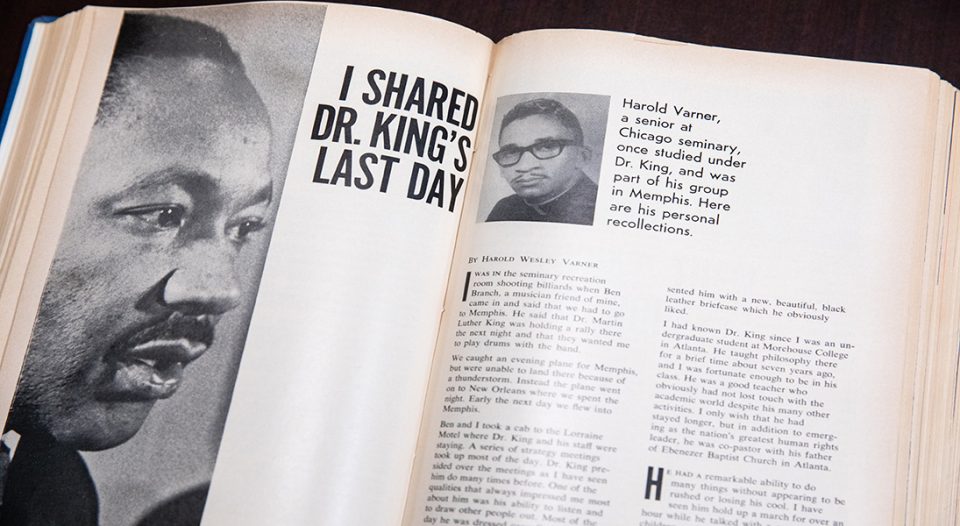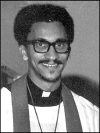Editor’s note: Following the assassination of Martin Luther King Jr. on April 4, 1968, The Lutheran ran the following article in its May 8, 1968, edition. The piece is a first-person account by then-Lutheran School of Theology at Chicago student Harold Wesley Varner, who was feet away from King when he was killed. Varner, who died in 1996, served as a Lutheran pastor in the 1960s and 1970s.
I was in the seminary recreation room shooting billiards when Ben Branch, a musician friend of mine, came in and said that we had to go to Memphis. He said that Dr. Martin Luther King was holding a rally there the next night and that they wanted me to play drums with the band.
We caught an evening plane for Memphis, but were unable to land there because of a thunderstorm. Instead the plane went on to New Orleans, where we spent the night. Early the next day we flew into Memphis.
Ben and I took a cab to the Lorraine Motel where Dr. King and his staff were staying. A series of strategy meetings took up most of the day. Dr. King presided over the meetings as I have seen him do many times before. One of the qualities that always impressed me most about him was his ability to listen and to draw other people out. Most of the day he was dressed casually in slacks and a silk pajama top which looked like a sport shirt. Someone had recently presented him with a new, beautiful, black leather briefcase which he obviously liked.
I had known Dr. King since I was an undergraduate student at Morehouse College in Atlanta. He taught philosophy there for a brief time about seven years ago, and I was fortunate enough to be in his class. He was a good teacher who obviously had not lost touch with the academic world despite his many other activities. I only wish that he had stayed longer, but in addition to emerging as the nation’s greatest human rights leader, he was co-pastor with his father of Ebenezer Baptist Church in Atlanta.
Dr. King asked me between meetings at the motel if I would be interested in joining his staff after I graduated from the seminary in June.
He had a remarkable ability to do many things without appearing to be rushed or losing his cool. I have seen him hold up a march for over an hour while we talked with a group of children and young people.
Dr. King asked me between meetings at the motel if I would be interested in joining his staff after I graduated from the seminary in June. I told him that I was interested, but right now I leaned toward the parish ministry. I assured him that I would continue to work in the movement as a parish pastor. He didn’t try to persuade me, but simply wished me God’s blessings on my decision.
I was never what could be called an “intimate friend” of Dr. King. He was too busy a man, and people were always clamoring for him. However, he knew me and was friendly to me. I know he knew my name was “Varner,” but he insisted upon calling me “Varn” for some strange reason. I am grateful that I had the opportunity to be in his presence several times. He had a great mind, and I regret that he will not be around to train other young men like myself.
That evening, I was on the second floor balcony of the motel about 10 feet from where Dr. King was leaning over a railing. The Rev. Jesse Jackson, one of his closest associates, and Ben Branch had gone downstairs to the parking lot. Dr. King came to the railing and said to Mr. Branch: “Ben, be sure and have them sing ‘Precious Lord, Take My Hand’ at the meeting tonight.” Later I recalled the words in the hymn about being weak and tired, and I thought that Dr. King looked especially tired that day.
As I was bending over to put the covers on my drums, I heard what sounded like a clap of thunder. I looked up to see Dr. King fall over backwards from the railing. Several of us rushed to his side. The bullet had literally exploded in his face. It tore away most of the right side of his jaw.
When I think about the sound of that shot and when I see Dr. King falling backward, I can’t help but think about the church.
One of his aides bent over and called to Dr. King, but there was no response. His eyes were rolled to the back of his head, and one knee remained bent in an upright position. I was sure that he was dead.
The police were on the scene immediately. I don’t know where they came from or how they got there so fast. They kept running toward us and Jesse motioned for them to go in the direction of the shot. I got a fleeting glance of someone running from the bushes near the motel, but I couldn’t possibly say what he looked like. I don’t know why the police didn’t turn in the direction of the shot rather than towards us.
When I think about the sound of that shot and when I see Dr. King falling backward, I can’t help but think about the church. I don’t think that we have really been preaching the Gospel to our people. We tell them that Christ shed his blood for us, but then we don’t let the blood flow off the altar and into the life of the world. We clot the blood and keep it on the altar. Blood must circulate if a body is to live. Any part of our body that doesn’t receive blood, dies.
We’re still going through the crucifixion rather than the resurrection. As long as the blood doesn’t flow out into the world, giving new life to people, we have a crucifixion, but not a resurrection.
We had one crucifixion; we don’t need any more. What we need now is resurrection. If we are not preaching living resurrection, we might as well all be crucified. We need resurrection, not insurrection.




